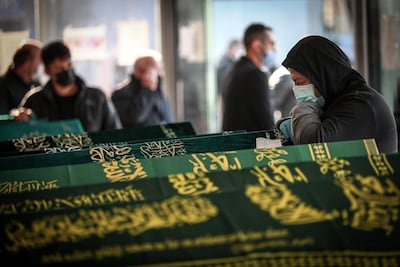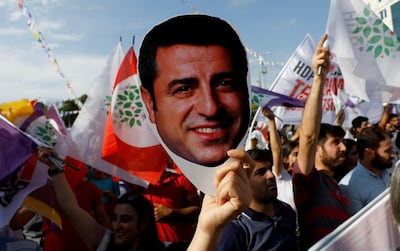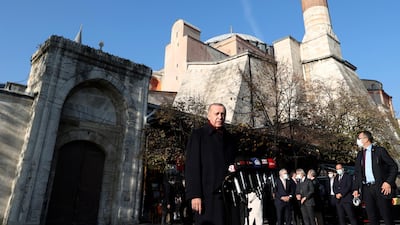In a surprising bit of good news for Ankara, Turkey outperformed all of the world’s leading economies in the third quarter, outpacing forecasts with 6.7 per cent real GDP growth thanks to a stimulus campaign that urged banks to lend.
That growth was a mirage, as it spurred a sharp devaluation in the lira and a fast-emerging Covid-19 crisis. After months of only announcing symptomatic cases, the Turkish government shifted its position last week and began revealing all new Covid cases.
Suddenly, with around 30,000 daily, Turkey ranked among the world leaders in terms of rising case numbers, confirming the fears of health experts who argued for months that Turkish authorities were hiding the true extent of the crisis. The Turkish Medical Association believes the declared numbers are still low, and that Turkey is actually seeing some 50,000 new daily cases. Either way, starting on November 15, Turkey experienced 16 consecutive days of record Covid-related deaths, putting its toll near 15,000.
The government last week put new restrictions in place, including weeknight curfews and weekend lockdowns. Restaurants are now delivery-only and foot traffic on major streets and squares, including Istanbul’s central Taksim Square, has been reduced. Authorities are said to be mulling further measures, including an extended lockdown over the New Year holiday. Yet Turkish officials are also aware that this spring’s lockdown led to a sharp economic contraction, of nearly 10 per cent.
Turkey is already seeing economic warning signs. Inflation rose to 14 per cent last month, its highest level since the summer of 2019, prompting US investment bank JP Morgan to warn that Turkey’s economy had serious vulnerabilities and its stewards had no room for error.
Investor rating service Moody’s recently downgraded Turkey’s debt rating deeper into junk status and said a balance-of-payments crisis was likely. A few weeks later the lira fell to an unprecedented low, beneath 8 to the dollar.
The currency stabilised somewhat after President Recep Tayyip Erdogan installed a new Central Bank director, who quickly raised rates, replaced his largely inexperienced son-in-law Berat Albayrak with a more experienced hand as Treasury and Finance Minister and announced a wave of economic reforms.
Still, dark clouds are gathering. For more than a year, US President Donald Trump has held off on sanctioning Turkey for its purchase of Russian-made S-400 missile defence systems – a move required under the US' 2017 Countering America's Adversaries Through Sanctions Act.
With the incoming Biden administration, that looks set to change. The final version of the US annual defence policy bill unveiled last week mandates that the President sanction Turkey for its S-400 acquisition within 30 days.

Also looming for Turkey are possible European Union sanctions in response to Ankara's aggressive posturing in the eastern Mediterranean, in particular its handful of exploratory drilling operations, backed by warships, in maritime areas claimed by EU members Cyprus and Greece.
Those two states and France have been calling on the EU to sanction Ankara for months, and the bloc’s leaders will take up the issue at a summit in Brussels starting on Thursday. “Turkey must stop its provocations and its hostile rhetoric,” Charles Michel, President of the European Council who will preside over the coming summit, said last Friday.
Meanwhile, Mr Erdogan is being challenged like never before. His Justice and Development Party (AKP) co-founder and former deputy prime minister, Bulent Arinc, last week called for the release of leading Kurdish politician Selahattin Demirtas and activist-philanthropist Osman Kavala, both of whom have been in prison for more than three years on widely questioned charges. Mr Erdogan denounced his long-time colleague, leading to Mr Arinc's resignation from a key advisory council and more talk of AKP fracturing, following last year's departure of two key figures. Also last week, the most pro-government of Turkey's polling groups, ORC Research, acknowledged for the first time that support for the parliamentary alliance between the AKP and the far-right Nationalist Movement Party (MHP) had fallen below 50 per cent. The AKP and MHP received support from 48.9 per cent of those polled, while the opposition alliance received 47.4 per cent – a gap within the margin of error.
Economically, Mr Erdogan has been here before. A mid-2018 currency crisis grew into an economic crisis mainly because, that August, the Trump administration sanctioned Turkey for the continued imprisonment of American pastor Andrew Brunson. A desperate Ankara freed Mr Brunson two months later and the economy stabilised, but has remained stalled.
President Erdogan surely remembers this episode, which is why he has been doing all he can to cozy up to the West and avoid sanctions amid a Covid crisis, which could be devastating, politically and economically. Turkey brought its drilling ship Oruc Reis, which has in recent months been a bellwether for its expansionist moves in the eastern Mediterranean, back to port and expressed a readiness for talks on Cyprus and maritime issues; reached out to Saudi Arabia, with Mr Erdogan's phone call to King Salman last month to smooth tensions; and to Israel, with intelligence chief Hakan Fidan leading an effort to normalise ties.
Turkish Foreign Minister Mevlut Cavusoglu last week said Turkey backed Ukraine’s international initiative to see Crimea returned to Ukraine, an agenda that will see its first summit in May, with France, Germany, the US and Britain in attendance, along with Turkey.

The next day Turkish presidential spokesman Ibrahim Kalin welcomed Zalmay Khalilzad, the US special representative for Afghanistan, to Ankara and voiced support for the ongoing Afghan peace talks. Mr Erdogan plans to announce Turkey’s judicial reform plan on Thursday, which happens to be global Human Rights Day, and some insiders have predicted he will release Kavala or Demirtas, or both.
Turkey and its Nato allies suddenly appear aligned on Saudi Arabia and Israel, Russia and Ukraine, the Afghan war and the eastern Mediterranean – and possibly, at least partially, the rule of law. Is it enough?
We’ll have a better idea of Turkey’s fate very soon. The day after the EU summit begins, Turkey plans to start administering the Chinese-made Covid vaccine to its healthcare workers.
David Lepeska is a veteran journalist who has been covering Turkey for the past decade


